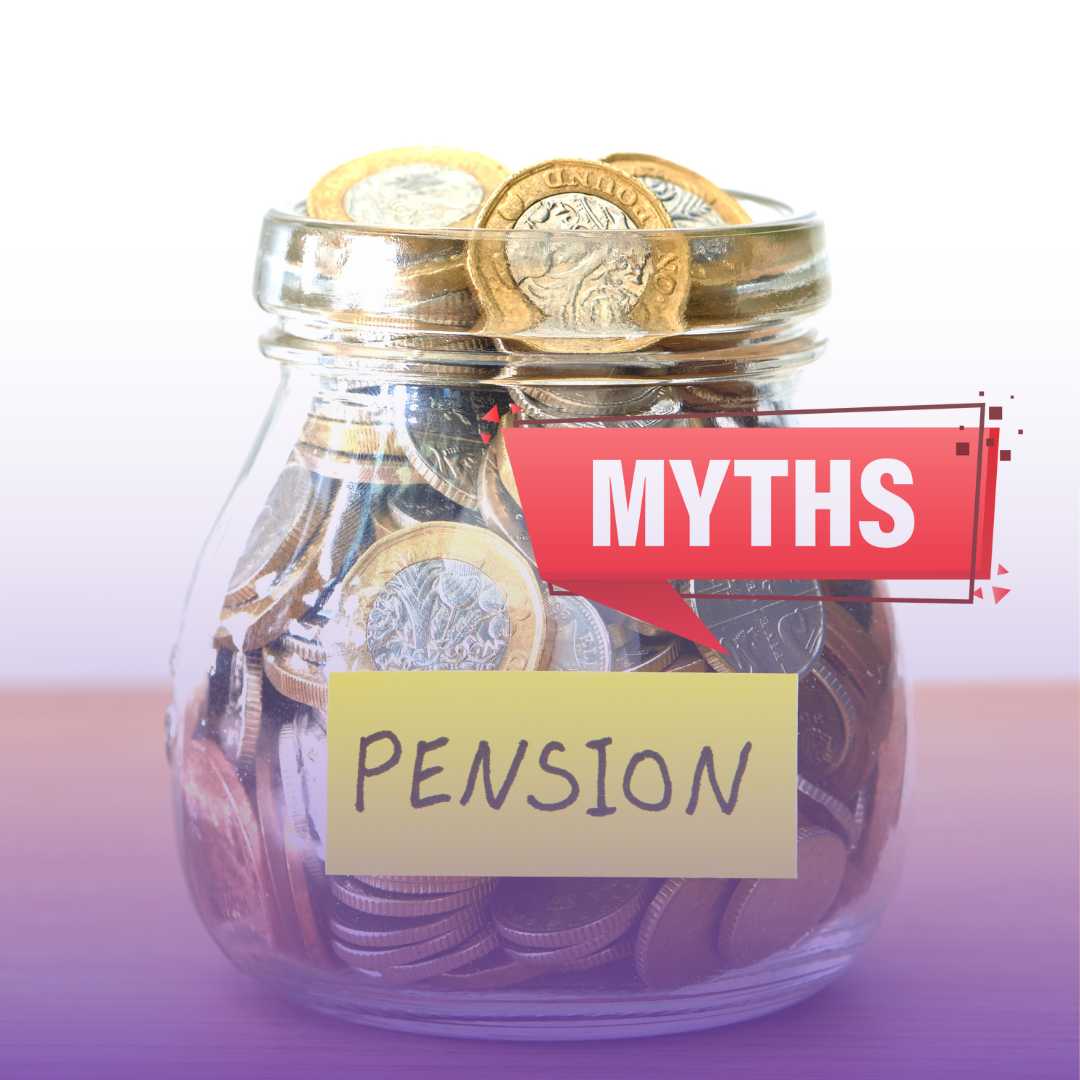Table of Contents
Saving for the future is hard enough without making it harder on ourselves, but that’s exactly what many of us do, often without even realising it. When it comes to pensions, many people put things off or avoid getting started because of common myths that sound true but really aren’t.
These misconceptions can lead to missed chances and habits that chip away at your financial future. And what feels like no big deal now can have a serious impact on your lifestyle down the line. So, let’s bust some of those myths before they mess with your future.
“I’m too young to worry about pensions.”
This is one of the most common myths out there and one of the most damaging. The truth is, the earlier you start, the more powerful your pension can become over time. That’s all thanks to something called compound interest, which basically means you earn interest not just on what you put in, but also on the interest that’s already built up. It’s like a snowball rolling down a hill; the longer it rolls, the bigger it gets.
Even if you’re only putting away a small amount each month in your 20s or 30s, you’re giving your money time to grow. And trust us, your future self will thank you for getting ahead while you can. Starting young doesn’t mean locking yourself into big payments—it just means giving your money more time to do the hard work for you
Read our guides: Retirement Planning in Your 20s and Retirement Planning in Your 30s.
“I’ll lose my pension if I change jobs.”
Not true and definitely not a reason to stay in a job that’s no longer right for you. Most people think their pension disappears the moment they move on, but that’s not how it works. In Ireland, if you’ve been with your employer for two years or more, you’ve built up pension benefits that are yours to keep.
You can choose to leave the money where it is, transfer it to a Personal Retirement Bond (PRB), or move it into your new employer’s scheme if they allow it. Even if you haven’t hit that two-year mark, you may still have options like a refund of your contributions or deferred membership.
Your pension doesn’t just vanish when you hand in your notice. It’s your money, and there are flexible ways to bring it with you or manage it as you move forward in your career.
And if you’ve had a few jobs over the years and aren’t sure where all your old pensions are, our pension tracing service can help you locate old or forgotten pension schemes from previous jobs, so you don’t miss out on what you’ve already earned.
“The state pension will give me all I need when I retire.”
It’s a nice idea, but unfortunately, it’s not the whole picture. The State Pension in Ireland is meant to act as a basic safety net, not a complete replacement for your income. As of 2025, the contributory State Pension is approximately €289 per week, equivalent to around €15,000 per year. While it might cover the essentials, it’s unlikely to stretch far enough for things like holidays, helping the grandkids, or simply enjoying the kind of lifestyle you’ve worked hard for.
And here’s the thing: you can’t even access the State Pension until age 66 (and that age may rise in the future). But with a private pension, you usually have the option to retire from age 60, or even as early as 50 in some cases, depending on the type of pension you have. That gives you far more flexibility and freedom to choose when and how you want to slow down or step away from work.
Relying solely on the State Pension could delay your retirement plans, while having your own pension gives you more control, more choices, and a better shot at enjoying retirement on your terms.
Read our Essential Guide to Pension and Retirement Planning.
Be smart with your money. Get a personalised quote today!
“I’m too old to start a pension now.”
This is one of those myths that prevents many people from taking action. The truth is, it’s never too late to start. Yes, beginning in your 20s or 30s gives your money the most time to grow, but that doesn’t mean there’s no point if you’re in your 40s, 50s, or even beyond.
The closer you get to retirement, the higher the percentage of your income you can contribute to a pension and still get tax relief. That means you can make bigger “catch-up” contributions and give your pot a serious boost in the years leading up to retirement.
Options like Additional Voluntary Contributions (AVCs) can help you top up your existing pension, and even if you’re self-employed, you can still put money into a Personal Retirement Savings Account (PRSA). Additionally, don’t forget that you can typically take up to 25% of your pension as a tax-free lump sum at retirement (up to €200,000), which is a significant incentive.
So, whether you’re 25 or 55, the best time to start a pension is always now. The sooner you take action, the more comfortable and flexible your retirement can be.
Read our guides: Retirement Planning in Your 40s and Retirement Planning in Your 50s and 60s.
“Pensions are confusing and hard to understand.”
You’re not alone; many people feel overwhelmed by pensions. All the talk about tax relief, funds, AVCs, and retirement ages can sound like another language. But pensions don’t have to be complicated. At their core, they’re simply a way of saving money for your future, with the government giving you generous tax breaks to encourage you.
Think of it like this: for every €100 you put into your pension, if you’re in the higher tax bracket, you could get €40 back in tax relief. That means it only really costs you €60. If you’re on the standard 20% tax rate, you’d still save €20 on that €100 contribution. That’s money straight back in your pocket, while your pension pot keeps growing.
Additionally, pensions are more flexible than most people realise. You can choose how much to put in, increase or reduce your contributions as life changes, and in many cases even decide how your money is invested. And when retirement comes, you can usually take 25% of your pot as a tax-free lump sum.
So, while pensions might seem confusing at first glance, once you break them down, they’re one of the simplest and smartest financial tools you’ll ever use.
Read Our Pension and Retirement Planning Guide
If you’re still unsure about how pensions really work, or you’d simply like a clearer picture of what your retirement options might look like, our Pension and Retirement Planning Guide is the perfect place to start. It breaks everything down in plain English so you can understand the different types of pensions available, the tax benefits you can take advantage of, and the steps you can take right now to build a more secure future.
Whether you’re just starting to think about saving or you’re closer to retirement and want to make sure you’re on track, this guide will give you the knowledge and confidence to make smarter financial choices. Think of it as your roadmap to a retirement that feels comfortable, flexible, and tailored to you.
Additionally, read our articles to learn more:
- Why a Private Pension in Ireland Is Smarter Than You Think
- Setting Up a Private Pension in Ireland
- 6 Reasons to Review Your Pension This Year
- 7 Smart Ways to Use Tax Relief to Grow Your Pension in Ireland
- What to Do 5 Years Before Retirement
Be smart with your money. Get a personalised quote today!
Get a Pension and Retirement Planning Quote
Not sure where to start or which pension is right for you? Whether you’re considering a PRSA, a PRB, or an occupational scheme, we can help you compare your options and find the plan that best fits your needs.
At lowquotes.ie, we make the process straightforward, so you can feel confident about your future. Taking even a small step now can make a significant difference later, providing you with more peace of mind and freedom when it’s time to retire. Get a quote today!
We provide a wide variety of financial services, such as mortgages, serious illness cover, pensions, financial planning, health insurance, and savings & investments.
Share this post
All our content has been written or overseen by a qualified financial advisor. However, you should always seek individual financial advice for your unique circumstances.
Warning: Past performance is not a reliable guide to future performance.
Warning: The value of your investment may go down and up.
Warning: If you invest in this product, you will not have any access to your money until you retire.
Warning: If you invest in this product, you may lose some or all of your investment.
Warning: This product may be affected by changes in currency exchange rates.





